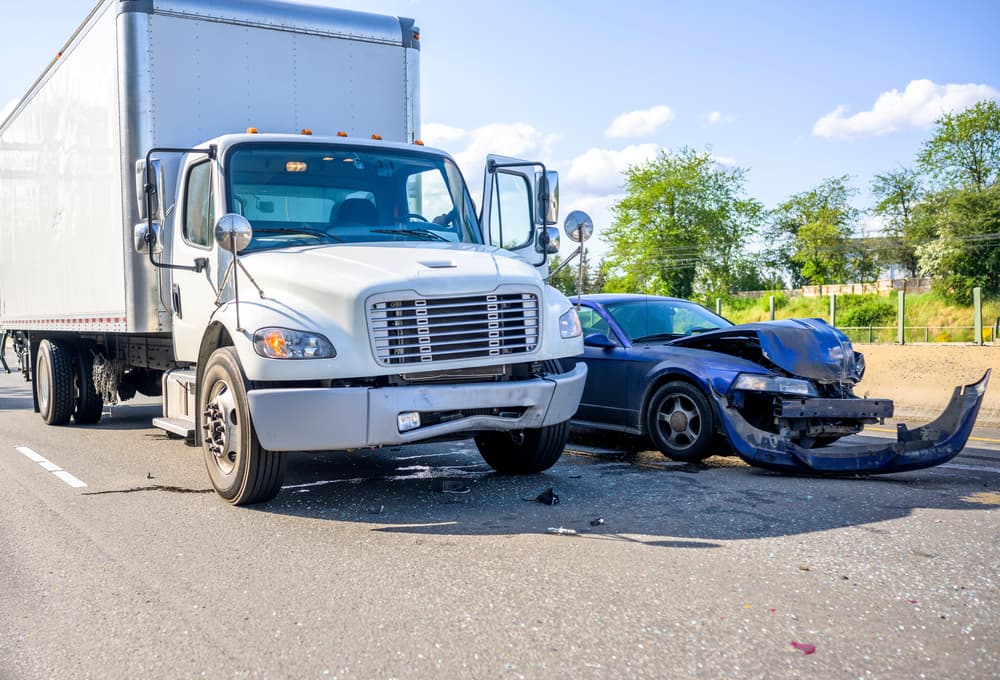When commercial truck drivers, trucking companies, and others behave in a careless or negligent manner, serious accidents that lead to debilitating injuries may occur. In most instances, it is the occupants of the smaller vehicle who endure most of the injuries in a commercial truck accident.
If you or a person you love recently suffered injuries in a truck collision, you are not alone. A knowledgeable St. Petersburg truck accident attorney can gather the appropriate evidence, review your accident circumstances with you, and determine your legal options for moving forward. Your lawyer can also manage every step of your personal injury claim or lawsuit for you, working to maximize your overall recovery.
How Do Truck Accidents Most Frequently Happen?
Commercial truck accidents can have devastating consequences, and responsibility for these accidents may extend beyond just the truck driver. Several parties involved in the trucking industry, including truck drivers, trucking companies, truck repair facilities, and truck parts manufacturers, can be responsible for accidents due to their negligence or failure to uphold safety standards.
Truck drivers themselves may be responsible for accidents if they engage in negligent behavior such as speeding, distracted driving, driving under the influence of drugs or alcohol, or violating hours-of-service regulations. Fatigue is a common issue among truck drivers who often face pressure to meet tight delivery deadlines, leading to impaired judgment and slower reaction times behind the wheel.
Trucking companies can also be liable for accidents if they fail to properly train and supervise their drivers, neglect to maintain their fleet of trucks or encourage unsafe practices such as overloading trucks or falsifying logbooks to exceed hours-of-service limits. In some cases, trucking companies may prioritize profits over safety, leading to shortcuts in maintenance, inadequate training, or unrealistic delivery schedules that contribute to accidents.
Truck repair facilities can be responsible for accidents if they perform substandard repairs or maintenance on trucks, leading to mechanical failures or defects that contribute to accidents. Improperly maintained brakes, tires, steering systems, or other critical components can increase the risk of accidents on the road.

Similarly, truck parts manufacturers may be liable for accidents if they produce defective or faulty parts that contribute to accidents. This can include brake systems, tires, steering components, or other parts that fail to meet safety standards or perform as intended. Manufacturing defects, design flaws, or inadequate quality control measures can all contribute to accidents and injuries on the road.
Proving liability in truck accident cases often requires a thorough investigation to identify all potentially responsible parties and gather evidence of their negligence or misconduct. This may involve obtaining maintenance records, conducting forensic examinations of the accident scene, reviewing electronic logging device data, and consulting expert witnesses to assess the cause of the accident.
By holding all parties accountable for their role in truck accidents, victims can pursue compensation for their injuries, medical expenses, lost income, and other damages resulting from the accident. Working with an experienced truck accident attorney can help accident victims navigate the legal process and maximize their chances of obtaining fair compensation for their losses.
Most Common Injuries in Truck Accidents
Commercial truck accidents can result in a variety of injuries due to the sheer size and force of these vehicles. When negligence is involved, the severity of injuries tends to increase. Some of the most common types of injuries resulting from commercial truck accidents due to negligence include:
- Traumatic Brain Injuries (TBI) — The impact of a truck accident can cause the head to strike objects within the vehicle or the interior of the vehicle itself. TBIs range from mild concussions to severe brain trauma, leading to cognitive impairment, memory loss, and changes in mood or behavior.
- Spinal Cord Injuries — The force of a collision can cause damage to the spinal cord, resulting in paralysis, loss of sensation, and impaired motor function. Spinal cord injuries often require extensive medical treatment and rehabilitation and may result in permanent disability.
- Fractures and Broken Bones — The force of impact in a truck accident can cause fractures and broken bones throughout the victim’s body. Common fractures include broken arms, legs, ribs, and pelvis, which may require surgery, casting, or immobilization to heal properly.
- Soft Tissue Injuries— Whiplash is a common soft tissue injury resulting from the sudden jerking motion of the head and neck in a truck accident. Soft tissue injuries can also include strains, sprains, and tears to muscles, tendons, and ligaments, causing pain, swelling, and limited range of motion.
- Internal Injuries — The blunt force trauma of a truck accident can cause internal injuries such as organ damage, internal bleeding, and abdominal injuries – all of which require prompt medical attention to diagnose and treat
- Burns and Lacerations — Truck accidents involving fire or vehicle damage can result in burns and lacerations to the skin. Burns can range from minor first-degree burns to severe third-degree burns requiring skin grafts and long-term medical care.
- Emotional Trauma— In addition to physical injuries, truck accidents can also cause emotional trauma, such as post-traumatic stress disorder (PTSD), anxiety, and depression. Emotional trauma can have significant repercussions on the victim's mental health and quality of life, requiring therapy and counseling for recovery.
Treatment for injuries sustained in commercial truck accidents may include emergency medical care, surgery, physical therapy, pain management, and psychological counseling. Seeking prompt medical attention following a truck accident is essential for diagnosing injuries and preventing further complications.
How To Prove Negligence in a Truck Accident Case
Successfully proving negligence in a claim or lawsuit involving a commercial truck requires gathering evidence and establishing key elements of negligence. This process involves demonstrating that the truck driver, trucking company, or other parties acted negligently, leading to the accident and resulting injuries. These are the steps involved in proving negligence in a commercial truck accident case:
- Duty of Care — The first step in proving negligence is establishing that the at-fault party (defendant) owed a duty of care to the injured victim (plaintiff). In the case of a commercial truck accident, the truck driver and trucking company owe a duty of care to other motorists, pedestrians, and passengers to drive safely and adhere to traffic laws and regulations.
- Breach of Duty — After establishing the legal duty of care, the next step is to show that the defendant breached that duty through negligent actions or omissions. This may include violations of traffic laws, failure to properly maintain the truck, inadequate driver training, or other negligent behaviors such as speeding, distracted driving, or driving under the influence of drugs or alcohol.
- Causation — The lawyer for the plaintiff must demonstrate that the defendant's breach of duty directly caused the accident and resulting injuries. This requires showing that the accident would not have occurred but for the defendant's negligence. Eyewitness testimony, accident reconstruction, expert analysis, and other evidence may all establish causation.
- Damages — Finally, the plaintiff must prove that they suffered actual damages as a result of the accident. This may include physical injuries, medical expenses, lost income, property damage, and pain and suffering. Documenting the extent of damages through medical records, bills, pay stubs, and other documentation is crucial for proving the financial and emotional repercussions of the accident.
To successfully prove negligence in a commercial truck accident case, it is essential to gather as much evidence as possible to support the claim. This may include police reports, witness statements, photographs of the accident scene and vehicle damage, electronic logging device data, maintenance records, and driver logs.
Working with an experienced truck accident attorney can be invaluable for building a strong case. An attorney can conduct a thorough investigation, gather evidence, consult experts, and advocate on behalf of the plaintiff to protect their rights so that they receive fair compensation for their injuries and losses.
Factors That Affect the Value of a Truck Accident Case

Several factors can influence the total value of a commercial truck accident claim or lawsuit, affecting the amount of compensation that the injured party may receive. Understanding these factors is essential for accurately assessing the value of a claim and pursuing fair compensation for injuries and losses. Here are some key factors that may affect the total value of a commercial truck accident claim:
- Extent of Injuries — The extent of injuries plays a significant role in determining the total value of the claim. More severe injuries that require extensive medical treatment and rehabilitation and result in long-term or permanent disability generally result in higher compensation amounts.
- Medical Expenses — The total value of the claim will include all medical expenses incurred as a result of the accident, including emergency room visits, hospital stays, surgeries, medication, physical therapy, and other necessary medical treatments. Keeping detailed records of all medical expenses is crucial for accurately calculating this portion of the claim.
- Lost Income and Earning Capacity — If the injured party is unable to work due to their injuries, they may be entitled to compensation for lost income and loss of future earning capacity. This includes both income lost during recovery and any reduction in earning potential due to long-term or permanent disability.
- Property Damage— Compensation for damage to the vehicle or other personal property damaged in the accident will also factor into the total value of the claim. This may include repair or replacement costs for the vehicle, as well as damage to personal belongings inside the vehicle.
- Pain and Suffering — Non-economic damages such as pain and suffering, emotional distress, and loss of enjoyment of life are also part of the total value of the claim. These damages are more subjective in nature but are intended to compensate the injured party for the physical and emotional toll of their injuries.
- Insurance Policy Limits — The insurance policy limits of the at-fault party's insurance coverage, as well as the injured party's own insurance coverage, may also affect the total value of the claim. If the policy limits are insufficient to cover all damages, the injured party may need to pursue additional compensation through other means, such as a lawsuit against the at-fault party.
Ways of Resolving a Truck Accident Case in Your Favor
Truck accident cases can be resolved through various methods, each with its own advantages and considerations. Understanding these options is essential for accident victims seeking fair compensation for their injuries and losses. The following are the main ways of resolving a truck accident case:
- Settlement — A settlement is a negotiated agreement between the parties involved in the accident, which their attorneys and insurance representatives typically facilitate. In a settlement, the injured party agrees to accept a certain amount of compensation in exchange for releasing the at-fault party from further liability. Settlements can be reached at any stage of the legal process, from before a lawsuit is filed to during trial proceedings. They offer the advantage of avoiding the time, expense, and uncertainty of a trial while providing a guaranteed outcome for both parties.
- Jury Trial — If the parties cannot reach a settlement, the case may proceed to the court system with a trial before a judge and jury. During a jury trial, both parties present evidence and arguments to the jury, who then determine liability and award damages based on the evidence presented. Jury trials offer the advantage of having an impartial third party decide the outcome of the case, but they can also be time-consuming, costly, and unpredictable.
- Mediation — Mediation is a voluntary process in which a neutral third party, known as a mediator, assists the parties in reaching a mutually agreeable settlement. The mediator facilitates communication between the parties, helps identify areas of agreement and disagreement, and facilitates negotiations to reach a resolution. Mediation offers the advantage of providing a confidential and flexible forum for resolving disputes while allowing the parties to retain control over the outcome of the case.
- Binding Arbitration — Arbitration is a process in which the parties agree to submit their dispute to a neutral third party, known as an arbitrator, who then reviews the evidence and renders a binding decision. Unlike mediation, arbitration results in a final decision that is legally binding on both parties. Arbitration offers the advantage of being faster, less formal, and more cost-effective than a trial, but it may not provide the same level of due process or appeal rights as a trial.
Settlement, jury trial, mediation, or binding arbitration are all methods of resolving a case — each with its own benefits and drawbacks. Choosing the most appropriate method of resolution depends on the specific circumstances of the case and the preferences of the parties involved.
Contact a Truck Accident Lawyer in Your Area Today

After suffering injuries in a commercial truck accident, consult an experienced truck accident lawyer right away. Your lawyer can notify you of your potential legal options after thoroughly investigating your case. Your attorney can also handle every step of the process for you, increasing your chances of obtaining a favorable financial recovery.